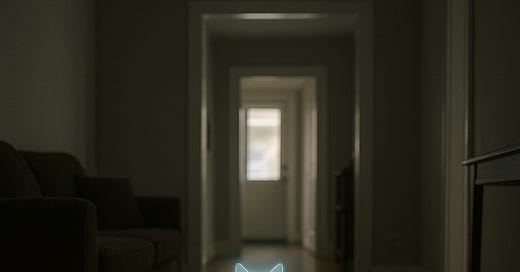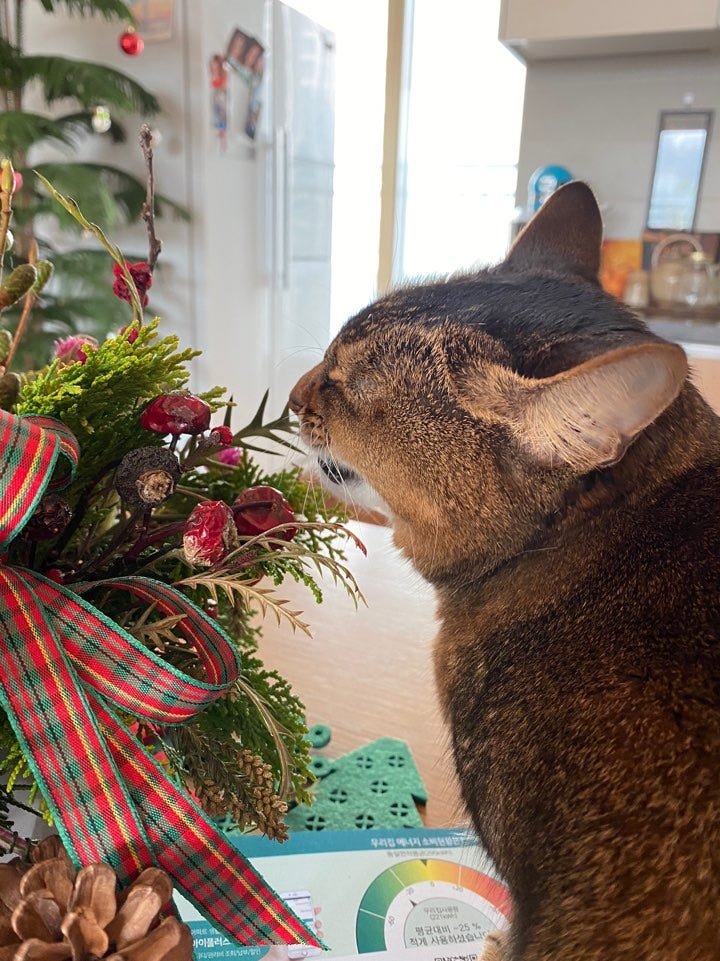When the House Went Quiet
Why Pets Matter So Much—and What a Near-Loss Taught Us About Their True Value
If you've ever dared to love something finite, this is for you.
Our recent near-death experience with our beloved cat Eva reminded us—painfully, beautifully—just how much pets can mean to us. But why do we love them so deeply? Why do they move us, soothe us, and devastate us unlike anything else?
This is a story. It's also an attempt to answer that question.
Losing the Illusion That There Was Still Time
Eva wasn’t dying. Not yet.
But that weekend, it felt like the clock started ticking—and the future we’d taken for granted began slipping away.
She had been healthy—visibly, marvelously so—for nearly sixteen years. Even the vet would smile and nod when he saw her glossy coat and youthful eyes. But that Friday, after days of vomiting, some alarming signs of blood in her urine, and growing concern, we brought her into a new clinic. For the first time, a vet ordered bloodwork.
By Saturday, everything changed.
The Saturday We Thought Was the Beginning of the End
That morning I was still cheery, assuming this was something we’d clear up with meds and rest. But as I studied her bloodwork and chatted with a veterinary AI assistant, things turned. I asked it to be blunt. It was.
Stage 4 CKD. Six to eighteen months. Comfort care only. No cure. Just a slow, quiet decline.
At first, I didn’t cry. I was absorbing, processing, functioning—shock can carry you that way. For a couple of hours, I moved calmly, even exchanged glances with my wife as she taught down the hall, each one heavier than the last. But eventually, standing alone in the bedroom, the shock cracked. I wept. The deep kind. The kind that comes from your marrow, like when my father died. I kept it hidden then. She wouldn’t know about that moment until I told her over wine that night.
That afternoon we visited Eva. She looked weak and frail—truly like a patient. The vet confirmed what the AI assistant had already told me: her numbers pointed clearly to late-stage kidney failure. In hindsight, I suspect he thought we must have been blind to have missed it. But Eva had shown almost no signs—she was energetic, alert, her coat shiny. The suddenness made no sense. It was as if something else had stolen her health overnight. But we didn’t know what.
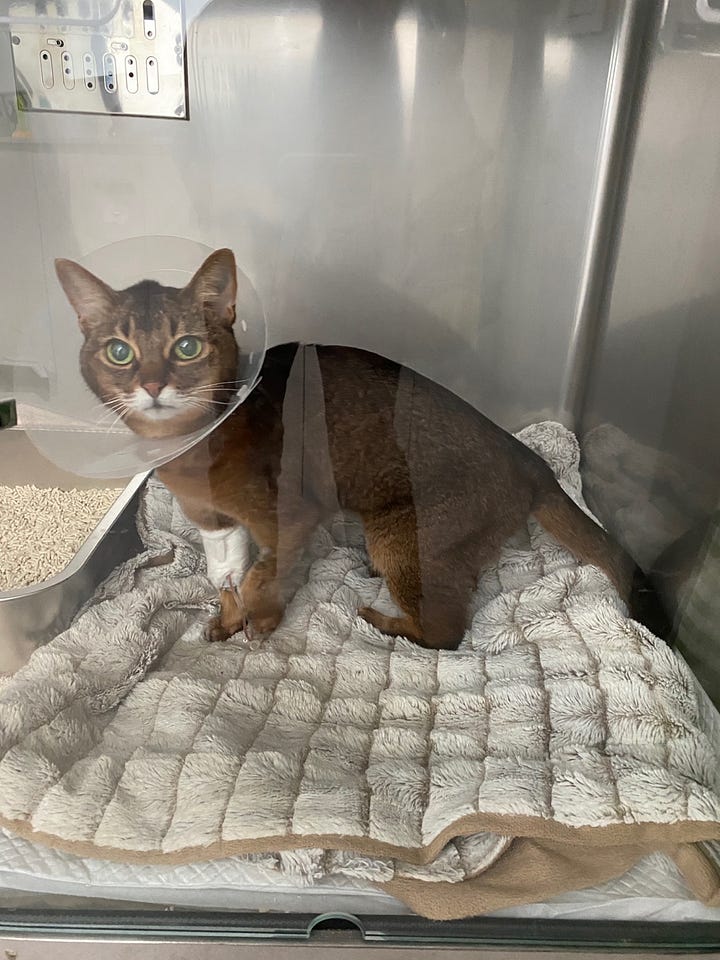

It was hard to see her like that, unsteady and unlike herself. But it was when we returned home that the weight of it truly landed. She wasn’t just not there—nothing was. No greeting at the door. And even when she doesn’t come to greet us, we always feel her somewhere—on her hammock in the sunroom, or as a lump under a blanket, too cozy to move. But this time? She wasn’t anywhere. The house didn’t feel empty—it felt hollow. The energy had been drained out of it. The very spirit of our home had gone with her.
That night we poured wine and tried to speak like people having a normal dinner. We couldn’t. “We have to talk about Eva,” I said, tearing the bandage clean.
It was a conversation like the ones you have at a funeral. Not always weeping, but never far from it. We laughed a little. We sat in silence. We cried. We held each other. Then cried again. For hours, the ache rose and fell like a tide.
We slipped into memory-mode, as if we were already recounting a life completed. And then we’d correct ourselves. She was still here—just not here. Not with us.
We talked about how we would take care of her—about everything from daily comforts to, if needed, buying a little IV trolley so she could stay mobile while receiving fluids at home. We wanted her last stretch, however long it might be, to be peaceful and familiar, surrounded by everything she loved. Leaving her in a sterile hospital, confused and surrounded by unfamiliar sounds and smells, would be the cruelest way to ask her to say goodbye. That simply wouldn’t happen. Not to her.
Eva hates being around other people. Always has. The vet staff thought she was a little monster—hissing, growling, impossible to handle. But when we visited and gently lifted her from her hospital bed, they began peeking around the doorway, one after another, murmuring, "Oh, she’s so nice!" It was a small, amazed parade. They couldn’t believe this calm, purring girl in my wife’s arms was the same wildcat they’d been dodging all weekend. And just as she began to eat, she heard their voices from the other room and started growling again, mid-bite. Classic Eva.
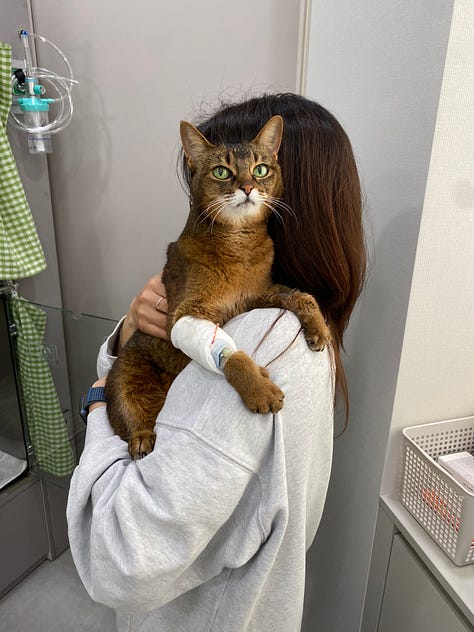
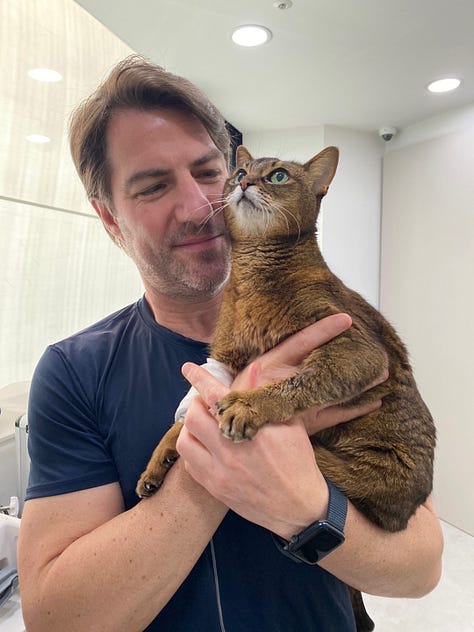
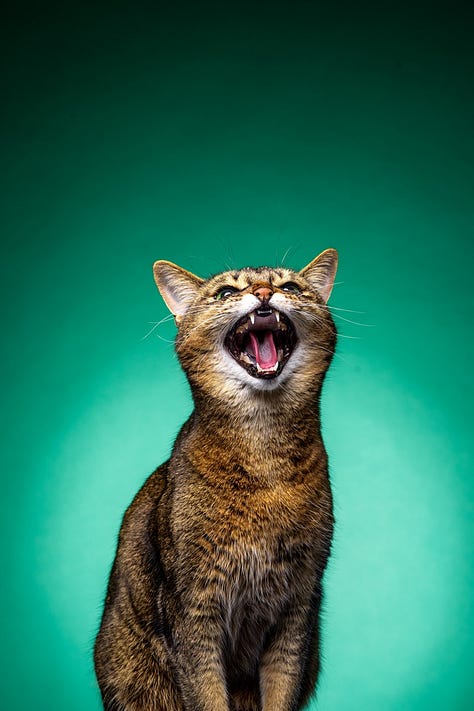
And yet—even those she snarls at adore her. Friends and family alike tend to remember her claws-up, hissing face, but they’re just as proud when she honors them by settling on their lap or accepting a pet. She’s beautiful, magnetic, and totally in charge.
So that night, we made promises. And eventually, we made peace.
It felt like a funeral. And in a way, it was. Just not quite yet.
(—this is a love letter to pets. And to people like you. Join us.)
And Then, She Was Back
By Sunday, her numbers were improving more quickly than expected—so much so that the vet ordered additional tests. Something didn’t add up. By Monday, he suspected an infection might be responsible for what we had thought was a sudden decline. The hope returned cautiously, built not only on the bloodwork but on how good she looked—alert, comfortable, even hungry.
And then the test results came back: E. coli. It had mimicked late-stage CKD. But now, it was gone.
Eva was flying again.
She was actually still in early-stage CKD—manageable, treatable, livable.
The illusion of death had passed. But the experience of mourning had changed everything.
Why Pets Matter So Much
Pets are not just animals. They are animated teddy bears with souls. They offer us something uniquely human without ever becoming human. They’re innocent, consistent, comforting, and unburdened by the flaws of people. They never betray, never grow away from us.
1. Indefinite Baby Stage
In that sense, they embody a perpetual babyhood—or as my wife and I call it, the 'indefinite baby stage'—the kind of relationship where the love is all give, never taken for granted, never corrupted.
Pets never outgrow their innocence. A child may become defiant or cruel. A spouse may drift. A friend may change. But Eva will always be Eva. Her mischief—walking on my face hours before my alarm, scratching furniture to make a point, even biting off plant bits to puke in protest—isn’t malicious. It’s instinct, filtered through a hilarious stubbornness. It's innocent. And deeply endearing.
2. They Give, and We Give, and It Only Grows
There’s something remarkable about the asymmetry of love we give to our pets. We give them everything, and it still feels like they give us more. They never drain us. They energize. When they’re sick, yes—we worry, we suffer. But when they’re well, it’s all surplus. Pure gain.
3. The Constant Presence That Animates a Home
When Eva was gone, the house was dead. Not quiet—hollow. No soft thumps from a hidden landing. No stretching groans. No cat-shaped silhouette in the window. She greets us at the door (except when sunbathing in the hammock), walks us to the hallway, checks our shopping bags ("What did you bring back from the hunt?"). Her presence is not background noise. It’s the spirit of the house.
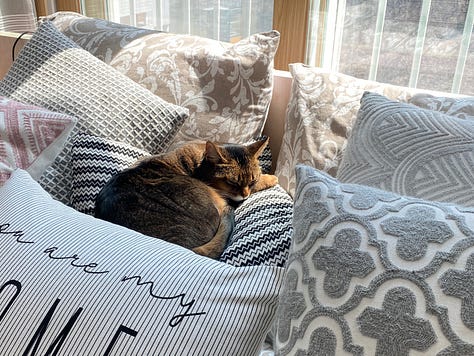
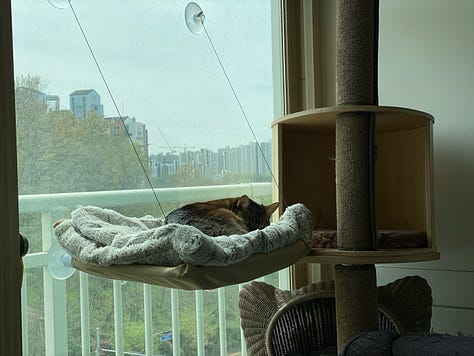
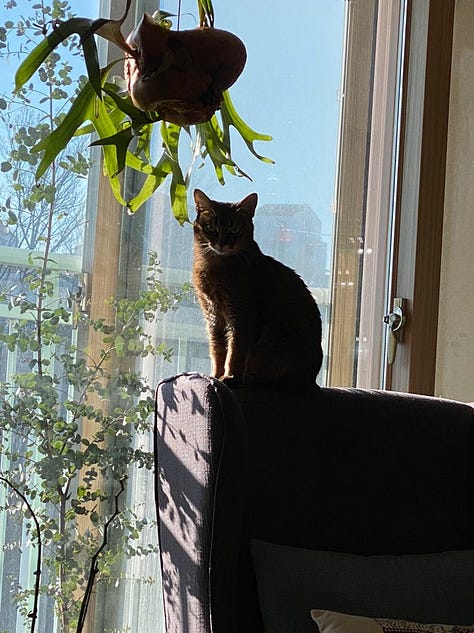
4. Marvels in Fur: Athleticism and Instinct
Sometimes I just watch her leap—to the bed, the windowsill, the top of a six-foot dresser—and marvel. She’s a compact, elegant machine of nature. I like to think of her as a miniature cougar, or maybe a panther—Abyssinians do have that look. Her precision in grooming, her postures, her tail flicks, her stillness and sudden action—they all command attention. She's a poem in motion.
And a shout out to dogs, too. There’s something undeniably magnificent in watching a dog track a frisbee across the yard, timing its leap just right to snatch it from the air like a gold-glove center fielder.
Different styles, same awe. Our animals remind us what unfiltered grace looks like.
5. Social Glue and Comfort Engine
Eva is a greeter, a smoother. Friends light up when they see her. She eases tension in a room. She’s not just our companion—she’s part of our social life. But more than that, she offers a gentle presence to focus on, something that softens the space between people without asking anything in return. We don’t always have to focus on each other, or on the stress of the day. Her quiet energy smooths the edges. She makes cohabitation feel more like harmony.
When one of us is upset, she finds us. Lies near us. There’s no training for this. It’s just... her.
6. The Healing Power of Touch
We pick Eva up constantly. I kiss her a hundred times a day. My wife cuddles with her just as much—Eva is always on one of us. If she settles in, the other is required to retrieve coffee, water, or whatever else might be needed. That's the rule: you don't disturb a cat at rest.
She sleeps with us every night. First curled beside me, or tucked on my legs while I read. Once the book goes down, she climbs over to nestle near my wife’s pillow for the rest of the night.
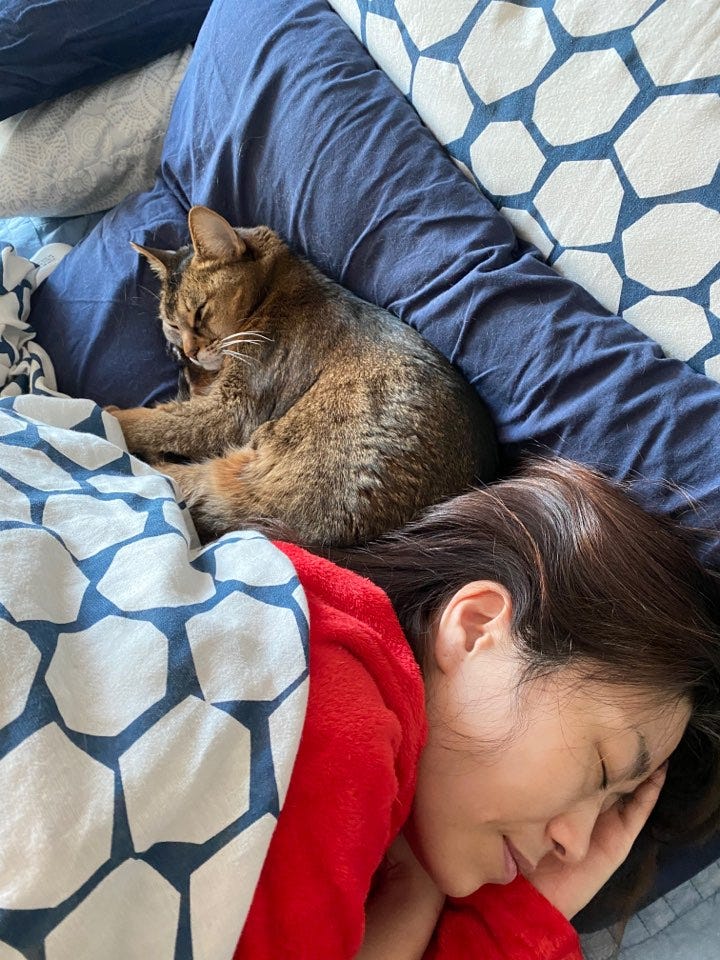
Holding her is therapeutic. And then there’s the purring—like a living lullaby. The low rumble of it doesn’t just soothe; it resets something. There’s science for this, surely—lowered blood pressure, reduced cortisol. But I don’t need a study. I feel it. It’s the closest I’ve come to hugging peace.
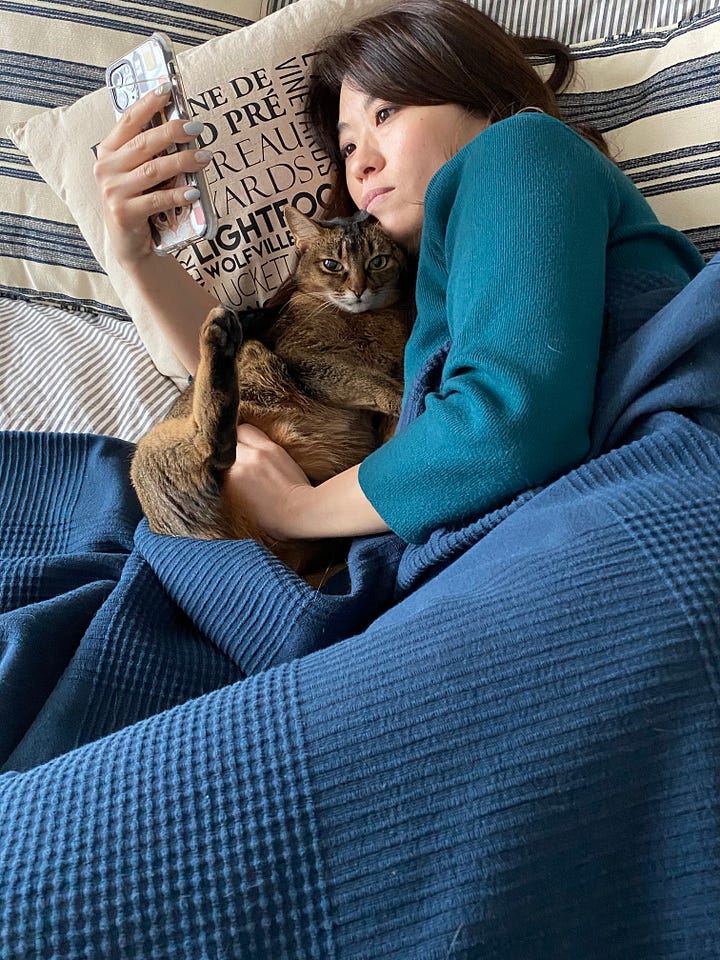
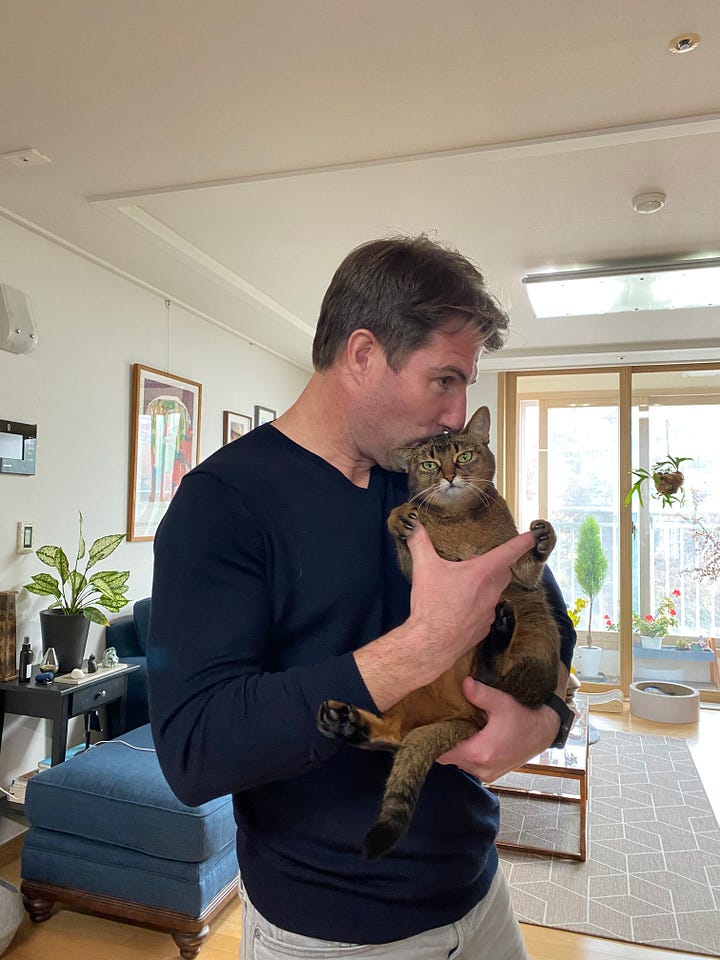
The Gift in the Grief
My wife and I have been to hell and back. And strangely, we've come out better for it. As awful as it was, the infection was a kind of blessing. It shocked us awake. We’re now more vigilant, more attuned, more prepared to help Eva thrive in this early stage for much longer than we might have. We’re strict with her diet, attentive to her behavior, and far more aware of the signs we might have once missed.
It’s like what people say after a near-death experience: everything sharpens. The light, the colors, the sense of time passing. Of course, we’ve always adored Eva, always appreciated her. But now, it’s different. There’s a present-ness to every moment. A kind of reverence.
We don’t love her as if she might leave—we love her knowing she will. And that makes every minute not less ordinary, but more treasured.
Why the Pain Is Proof
That Saturday, as I stood alone crying in the bedroom, I wondered whether this much pain was ever worth it. I just wanted it to stop.
But I realized something: this wild pain was a measurement. It was the proof of how much she meant to me. Of what she is to us.
Oh, our dear Eva.
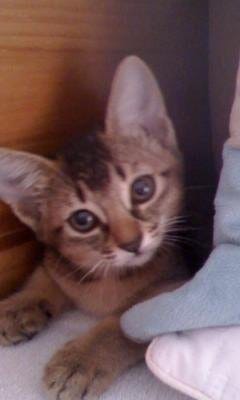
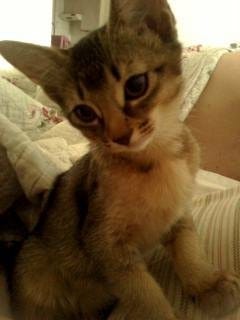
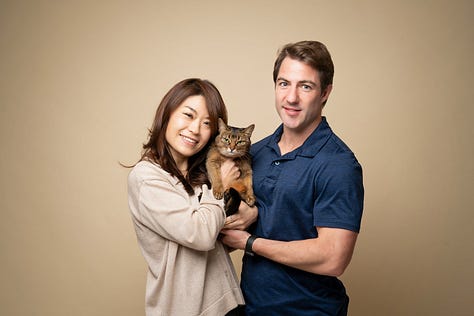
I’d love to hear your story—about your Eva, your Max, your Pepper, your Mochi. The little soul who makes your life feel whole.
(—cats, dogs, and humans welcome.)

